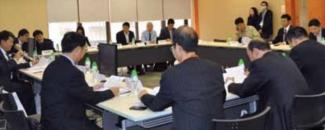The HKICS launched its Regional Board Secretary Panels (RBSPs) in 2010 as a forum for training and professional networking among board secretaries in mainland China. The latest RBSP meeting was held in January this year in Hong Kong and focused on the induction of directors.
Good corporate governance is noteasy to achieve. This has become more widely recognised in recent years, as has the indispensable role of the board secretary in promoting good governance. Indeed, companies have come to increasingly rely on board secretaries in a wide range of corporate governance areas: they are responsible for information disclosure and compliance matters, establishing effective internal controls and the induction of directors (particularly independent directors) to familiarise them with the operations of the company and their responsibilities.
The latest of the Institute's Regional Board Secretary Panel meetings was held in January this year in Hong Kong on the theme of the induction of directors and board governance. The meeting attracted some 20 senior managers from well known enterprises in mainland China and Hong Kong. There was a lively exchange of views on the headline topic of the meeting as well as other current issues of concern to board secretaries. The meeting was chaired by HKICS Vice-President Dr Maurice Ngai. Dr Gao Wei, Board Secretary of Sinotrans Ltd and HKICS Council member, together with Mr Wang Wensheng, Board Secretary of China Petroleum & Chemical Corporation (Sinopec), gave the keynote speeches and shared their experience during the meeting. Mohan Datwani provided the technical support.
Induction of directors
In his presentation, Dr Gao Wei examined the key duties of directors of listed companies and the important task of inducting directors effectively. The induction of directors is a crucial part of a board secretary's duties since it is essential for the proper functioning of the board that directors understand their responsibilities under the law and are familiar with the company's business. This knowledge and awareness are precursors to effective communication among board members. Dr Gao pointed out that the induction should start before the relevant directors’ terms of appointment, and should begin with an overview of relevant rules and regulations. The induction should explain the internal control procedures of the listed company and major issues of compliance, including notifiable transactions, connected transactions, the Code on Takeovers and Mergers and business related matters. However, the induction is only the beginning of the process and board secretaries should arrange continuing professional development (CPD) training for directors after their appointment. He noted that many of the CPD seminars organised by the HKICS are suitable for directors.
Regarding the content of the induction programme, Dr Gao suggested that issues such as the basic duties and functions of directors, types of directors and committees, listing rules, disclosure of interests and insider dealing should be included. He noted, however, that directors need to consider more than black letter law. Under the common law, a company director cannot simply act according to his own will, his acts must be reasonable. Dr Gao pointed out that directors also have a fiduciary duty to act honestly for an appropriate purpose in the interests of the company and avoid conflicts of interests. Directors must also participate actively in the affairs of the listed company and cannot disclaim responsibility on the grounds of absence from meetings, non-participation in the decision-making process or the existence of alternate directors.
Good governance and the board secretary
Mr Wang Wensheng of Sinopec stressed in his presentation that the board of directors is the link between the owners and the managers of the company, playing a pivotal role in the functioning of the governance structure of the company and is the key to corporate governance. Good corporate governance is the cornerstone of the healthy development of a company, regulating the relations between the company and its stakeholders, including shareholders, through appropriate systems or mechanisms which facilitate decisions and protect the interests of relevant parties.
Citing the example of the internal governance system of Sinopec, he explained the importance of setting up effective internal systems including internal controls, the work of independent directors, information disclosure, investor relations, registration of persons who have knowledge of inside information, as well as securities trading requirements in respect of directors, supervisors, senior managers and employees.
Mr Wang said that Sinopec is listed in China, Hong Kong, the UK and the US and to meet the disclosure requirements of these different jurisdictions, the company adopts a principle to abide by the strictest of the disclosure rules it is subject to. Greater transparency can foster trust among investors and members of the public, protect the lawful rights and interests of the company, shareholders (especially minority shareholders) and creditors, and allow the capital market to reflect the true value of the company. He added that the board secretary gives essential support to directors in the fulfilment of their duties. The board secretary maintains communication with directors, keeps track of the latest rules and regulations, and ensures adequate participation by independent directors.
Representatives of companies in mainland China and Hong Kong present at the meeting also participated actively in the discussion of current issues of concern, including:
- internal information flow and monitoring
- directors’ liability
- organisation of visits and
programmes to familiarise independent directors with the operations of the company
- requirements for the appointment of independent directors, and
- the benefits of independent directors to the board.
Mr Li Zhidong, Board Secretary of Guangzhou Shipyard International, explained that training of directors in his company comprises formal training sessions conducted by the Hong Kong Stock Exchange, Shanghai Stock Exchange or the China Securities Regulatory Commission, as well as briefings on new rules given by specially engaged legal counsels, which gives directors an independent perspective. He also stressed that the importance attached by management to corporate governance is particularly essential. Guangzhou Shipyard International has three board secretaries dedicated to the supervisory board, the executive board and the company as a whole.
Mr Cai Wei, Vice-President and Board Secretary of Dongfeng Automobile, said that, apart from the usual induction programme for directors, his company has set up relevant systems and established specialist groups under the board of directors’ office to take care of matters including audit, internal control and investor relations. They are required to feed daily information of the company to independent directors and answer their enquiries, providing support to directors on various fronts to ensure that they are well informed and perform their duties properly.
Swapping notes
Ms Huang Huilan, Company Secretary and Deputy General Manager of the Investor Relations Department of China Mobile, expressed the view that board secretaries of mainland companies listed in Hong Kong are currently facing more challenges than company secretaries of local companies listed in Hong Kong. It is essential that company secretaries from the two markets share their experiences and discuss relevant practices, she added.
Mr Wang Weimin, Director of Listing in Asia of the Standard Chartered Group and Company Secretary of Standard Chartered Bank (Hong Kong) Ltd, said that sharing between company secretaries in Hong Kong and board secretaries in mainland China is instrumental to a better understanding of the operating environment, compliance requirements and best practices in the mainland, and enhancing the standard of the Hong Kong company secretary in overseeing business operations in the mainland.
Dr Maurice Ngai, Vice-President of HKICS, said that diversity of independent directors would greatly help the company. At various stages of development of the company's business, independent directors with different backgrounds and expertise can be appointed to support the strategic development of the company.
Dr Gao Wei said that independent non-executive directors must meet the criteria of independence, which includes not holding more than one percent of the shares of the listed company and restricting business dealings with the company to avoid conflicts of interests. Since the adoption of Main Board Listing Rule 3.10A in Hong Kong, independent non-executive directors are now required to form at least one third of the board. Moreover, the chairman of the board must meet non-executive directors at least once a year. Shareholders’ approval is required for the appointment of an independent non-executive director for over nine years.
When appointed, directors have to sign an undertaking with the Stock Exchange to the effect that they will comply with the Listing Rules, and comply to the best of their ability with all applicable laws, regulations and codes, including the Code on Takeovers and Mergers, the Code on Share Repurchases and the Securities and Futures Ordinance. Directors will also confirm that the listed company will comply with all relevant rules.
At the meeting, Dr Gao mentioned that directors must disclose dealings in the securities, structured products and derivatives of the listed company; the interests of their family; the companies that they control; as well as interests in trust. Directors must also bear in mind that according to the Model Code for Securities Transactions by Directors of Listed Issuers, they cannot deal in any securities of the listed company during the period of 30 days immediately preceding the publication date of the company's quarterly results and half- year results, and 60 days immediately preceding the publication date of the company's annual results.
Dr Gao pointed out that there are in general six categories of market misconduct in Hong Kong, namely: insider dealing; false trading; price rigging; prohibited disclosure of information; disclosure of false or misleading information; and stock market manipulation.
There has been an increasing focus on insider dealing in Hong Kong. The Securities and Futures Commission may initiate civil proceedings, referring such cases to the Market Misconduct Tribunal, or it may refer them to the Department of Justice
for prosecution. Directors are persons connected with a listed issuer. If a director is in possession of unpublished inside information and deals in securities of the company, or counsels or procures another to deal in securities of the company, this will constitute insider dealing.
Regarding the duties of the board secretary, Mr Wang Wensheng of Sinopec said that the board secretary assists the board of directors in strengthening the governance mechanism of the company, takes charge of communication with securities regulatory authorities, assists the board in mapping out the capital market development strategy of the company, and is responsible for managing information disclosure, investor relations and shareholding matters.
He considered that the work of the board secretary is both a science and an art. It is a 'ruler’ to measure the level of compliance of the decision-making process in the board and at shareholders’ meetings. It is also a bridge, fostering effective communication between independent directors and the company, between the company and the regulatory authorities, and between the company and investors. In sum, the work of the board secretary is not simply to remind directors what they should not do, board secretaries should also try to propose solutions and help to chart the best course for the company in its future development.
Kenneth Ko, Journalist
The Regional Board Secretaries Panel meeting was held on 24 January 2013 in Hong Kong and coincided with this year's China Corporate and Regulatory Update which will be reviewed in next month's CSj.
The HKICS is currently updating its 'Guidance on Directors Induction'. The revised guide will be available shortly on the HKICS website.
香港特許秘書公會於2010年開始舉辦董 事會秘書圓桌會議,為中國內地董事會 秘書提供培訓,並讓他們作專業交流。 最近一次圓桌會議於今年1月份在香港 舉行,主題是啟導董事。
要做 好 公 司 治 理 , 绝 不 是 一 件 容 易 的 事 。 公 司 秘 书 〈 即 董 事 会 秘书〉在促成良好企业管治过程中, 扮演着不可或缺的角色,工作既繁且 重,负责上市公司信息披露和合规合 法的事务,还要建立内部控制制度, 以及启导董事和独立董事,让他们清 楚了解公司运作及其所承担的责任。
香 港 特 许 秘 书 公 会 最 近 在 香 港 举 办 的 主 题 为 董 事 启 导 与 董 事 会 治 理 的 「2013年公司秘书/董事会秘书圆桌会 议」,吸引了约20位中港知名企业高 级管理人员参与,大家热烈发言及讨 论,就公司秘书工作与关心的议题交 换意见。会议由香港特许秘书公会副 会长魏伟峰博士主持,中国外运股份 有限公司董事会秘书及香港特许秘书 公会理事会成员高伟博士,及中国石 油化工股份有限公司〈中国石化〉董 事会秘书黄文生先生分别在圆桌会议 上作了主题发言和经验分享。
啟導董事
高伟博士在发言中探讨了上市公司董 事的基本职责,以及公司如何有效地 启导董事的工作。他指出,启导董事 是董秘非常重要的工作。公司秘书要 向董事会提供支持,确保董事了解所 承担的责任及遵循法律守则,并促进 董事会成员间的信息沟通。
高伟博士说,董事启导应在董事任命 前开始进行,为董事提供相关规则与 规定的宏观介绍;董事任命后,公司 秘书须为董事们安排持续专业培训, 而香港特许秘书公会每年组织的100多 次讲座均适合董事参加。有关董事启 导的实践,他建议就董事基本职责、 董事及委员会的类别、上市规则、权 益披露及内幕交易等议题进行研讨。
在普通法中,公司董事不能简单地按 照自己的意愿行事,必须行为合理。 高伟先生指出,董事亦须尽信义义务 (FIDUCIARY DUT Y),为恰当目的并且 诚实地以公司利益为前提行事,避免 利益冲突。此外,董事须积极参与上 市公司的事务,不能因未参加会议及 声称未参加决策,或者指派替补董事 而免除其责任。
董事會秘書與良好公司治理
中国石化的黄文生先生强调,董事会 是公司所有者与管理者之间的纽带, 对 公 司 治 理 结 构 的 运 转 起 决 定 性 作 用,是公司治理的关键。良好的公司 治理是公司健康发展的基石,通过制 度或机制来协调公司与股东等利益相关 者之间的关系,以促进公司决策,维护 各方利益。他以中国石化的内部治理制 度为例,解释设立有效制度的重要性, 以加强管理,处理不同事务,诸如内部 控制、独立董事工作、信息披露、投资 者关系工作、内幕信息知情人登记、以 及董事、监事、高级管理人员和员工证 券交易规定等。
黄文生先生说,中国石化是一家在中港 英美四地上市的企业,为满足各地市场 的信息披露要求,公司的原则是「从多 不从少,从严不从宽」。高透明度的信 息披露可以提高社会会众及投资者对公 司的信任度,保护公司、股东和债权 人,特别是中小股东的合法权益,使资 本市场真实反映公司的价值。他又说, 董秘为董事履职做好支撑,与董事保持 充分沟通,跟踪最新监管规定,并保障 独立董事充分参与。
与会的中港企业代表也踊跃发言,就 关心的议题进一步讨论,包括内部信 息流程和监控、董事的责任承担、组 织独立董事考察和熟悉公司生产经营 情况、聘任独立董事的要求以及他们 对董事会产生的效益。广船国际公司 秘书李志东先生介绍说,其公司董事培训主要通过两方面,一是港交所、上 交所或证监会的正式培训班,二是由专 门聘请常年法律顾问讲解新的规则,這 更有说服力;而公司管理层的重视尤其 重要,为此公司同时设董事会秘书、公 司秘书、监事会秘书,各司其董事会治 理的规管职责。东风汽车副总裁兼董事 会秘书蔡玮先生指出,除了常规的董事 启导,公司制定了相关制度并在董事会 办公室设有专门的审计、内控、投资者 关系等专业小组,按规定向独立董事提 供公司日常资讯并回答有关问题,多层 次为董事提供支援,确保其知情并恰当 履职。
交流經驗
中国移动公司秘书兼投资者关系部副 总经理黄蕙兰女士认为,担任内地在 港上市公司的公司秘书较香港本地上 市公司的公司秘书会面临很多新的挑 战,两地同行交流分享有关经验,研 讨相关实务问题非常有必要也很有意 义。渣打集团亚洲区上市事务总监、 渣 打 香 港 公 司 秘 书 王 为 民 先 生 则 指 出,两地公司秘书/董事会秘书开展执 业交流,有助于更好的了解内地营运 环境、合规要求与最佳实践经验,提 高香港公司秘书规管内地业务运营的 合规水准。香港特许秘书公会副会长 魏伟峰博士说,独立董事的多元化将 对公司产生更大帮助,公司也可以根 据业务发展情况,在不同阶段聘任不 同背景及专长的独董,配合公司的战 略发展。
高伟博士说,独立非执行董事必须满足 独立性的要求,不能持有上市公司超过 1%的股份,及受到与上市公司业务往 来的限制,避免利益冲突。董事会成员 中须至少有三份之一的独立非执行董 事,董事会主席须每年与非执行董事们 至少会面一次,而独立非执行董事任命 超过9年者须获得股东的批准。
董事在获得任命时须向交易所签署承 诺书,承诺其接受上市规则,并将尽 其所能遵守所有适用的规则与守则, 包括《公司收购及合并守则》及《股 份 回 购 守 则 》 , 及 《 证 券 及 期 货 条 例》。同时,董事也须确保上市公司 遵守规则。
高伟博士在会议上提到董事须就上市 公 司 的 证 券 、 结 构 性 产 品 、 衍 生 产 品的交易做出披露,涵盖董事的家族 利益、配偶、未成年子女、拥有控制 权的公司及信托利益等。董事还须了 解根据《董事进行证券交易的标准守 则》,他们不能在上市公司季报、半 年报刊出前30天及公司年报刊出前60 天的禁止买卖期内买卖其所属上市公 司的任何证券。
高伟博士指出,香港股市一般有6种市 场失当行为,包括内幕交易、虚假交 易、价格操纵、披露关于受禁交易的 信息、披露虚假或具误导性信息以诱 使进行交易及市场操纵。内幕交易为 最主要的市场失当行为,证券及期货 事务监察委员会可以提起民事诉讼, 交由市场失当行为审裁处处理,或者 建议律政司进行刑事立案处理。董事 是上市发行人的关连人士。如果董事 利用未发布的内幕消息进行交易、纵 使或促使另一人进行交易,该董事行 为即构成内幕交易。
高伟博士又说,董事须对上市公司的 战略与政策做出贡献,也应就股东所 关注的事宜持平衡的态度。作为良好 公司治理的一部分工作,公司秘书须 安排董事启导,向董事讲解上市公司 的内控程序及合规方面的重要事宜, 包括须予公布的交易、关连交易、收 购合并守则及业务相关事宜。
有关董秘职责方面,中国石化的黄文 生先生说,董秘在公司治理中协助董 事会加强公司治理机制,管理与证券 监管机构的沟通联络事务,协助董事 会制定公司资本市场发展战略,并负 责管理信息披露、投资者关系及股权 事务。他认为,董秘工作既是科学, 也是艺术。它就是一把「尺子」,协 助并衡量董事会及股东大会决策事项 的合法合规水平,它亦是一座桥梁, 搭建独立董事与公司、公司与监管机 构及公司与投资者之间有效联系的桥 梁。总而言之,董秘不能简单地提醒 董事某些事情不能做,还要致力提出 「解决方案」的建议,帮助寻找公司 在资本市场发展的最佳路径,为公司 发展提供更大空间。
高锦坚 〈记者〉
公司秘書/董事會秘書圓桌會議,2013 年1月24日於香港金鐘道95號統一中心 統一會議中心舉行,時間上與今年的中 國企業規管最新發展研討會會期脗合。 研討會的內容,將於下期報道。
公會現正更新有關啟導董事的指引, 新版指引短期內可於公會網站內刊物 一欄瀏覽。


